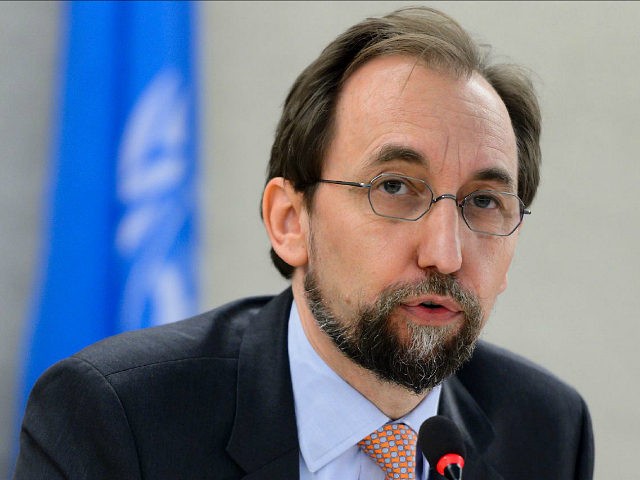The United States is the top contributor to a United Nations office headed by a Jordanian Prince who has repeatedly lambasted President Trump and other populists as “clever cheats” and compared them to the Islamic State (ISIS).
A new annual report issued Thursday by the Office of the High Commissioner for Human Rights (OHCHR) showed that the U.S. voluntarily paid just over $17 million in 2016, making it the top voluntary contributor to the agency.
The High Commissioner himself, Prince Zeid Ra’ad Al Hussein, has made a name for himself as an anti-Trumper, and in May, the former Jordanian ambassador to Washington was the subject of a profile in Foreign Policy magazine calling him “The Arab Prince Standing Up to Trump.”
In a speech in September, Zeid delivered a speech to The Hague in which he attacked Dutch populist Geert Wilders, comparing Wilders, along with then-candidate Trump and other populist European leaders, to ISIS.
“And yet what Mr Wilders shares in common with Mr Trump, Mr Orban, Mr Zeman, Mr Hofer, Mr Fico, Madame Le Pen, Mr Farage, he also shares with Da’esh,” he said, using another acronym for the Islamist group.
“All seek in varying degrees to recover a past, halcyon and so pure in form, where sunlit fields are settled by peoples united by ethnicity or religion – living peacefully in isolation, pilots of their fate, free of crime, foreign influence and war. A past that most certainly, in reality, did not exist anywhere, ever. Europe’s past, as we all know, was for centuries anything but that,” he said, before calling those who push such ideologies “cheats. Clever cheats.”
Zeid later clarified in the speech that he was not comparing the actions of populists with ISIS, but only the modes of communication, saying “the propaganda of Da’esh uses tactics similar to those of the populists.”
Considering Zeid’s role as a high commissioner, which he has held since 2014, and given its reliance on funds from the United States, it may be presumed that he would tone down his rhetoric once Trump won the election in November — not so.
In January, after Trump announced his temporary travel ban on immigrants and refugees from a number of terror hotspots, Zeid blasted the ban as “mean-spirited” and argued that it was illegal under international law.
"Discrimination on nationality alone is forbidden under #humanrights law" – @UNHumanRights Chief #Zeid pic.twitter.com/EpYpEpyYrf
— UN Human Rights (@UNHumanRights) January 30, 2017
In February, at the Human Rights Council’s Opening Session in Geneva, he said he was “proud” of members of his staff who attended the anti-Trump “Women’s March” the day after Trump’s inauguration, although he claimed they were not “about a particular individual or government.”
The unprecedented marches of 21 January this year were not, I believe, about a particular individual or government – although many saw them as such. I believe the marches were for the rights of women, the human rights of women, for all of us, for a fair and inclusive humanity. I was proud members of my staff took part. We must stand up for human rights. When humans understand fully they have rights, it is next to impossible to make them un-know it.
In the same speech, he took a veiled swipe at Trump when he warned against political actors who threaten to withdraw from “parts of the multilateral system.”
“We will not sit idly by. For we have much to lose, so much to protect. And our rights, the rights of others, the very future of our planet cannot, must not be thrown aside by these reckless political profiteers,” he said.
His comments came amid rumors the U.S. was planning to exit the Human Rights Council over long-standing concerns over its anti-Israel bias and questionable membership that includes Saudi Arabia, Venezuela, and Cuba. Zeid’s office is separate from the Human Rights Council but works closely with it.
Last week, when President Trump announced that the U.S. would be pulling out of the 2015 Paris climate accord, Zeid called the U.S. move “inconsistent with its human rights obligations to those affected by climate change.”
UN #HumanRights Chief #Zeid on the #US withdrawal from #ParisAgreement pic.twitter.com/JsyeA7EIYG
— UN Human Rights (@UNHumanRights) June 1, 2017
The Trump administration has so far avoided going after Zeid directly but has targeted the Human Rights Council. U.S. Ambassador to the U.N. Nikki Haley will visit the body in Geneva this week, days after she penned an op-ed for The Washington Post, calling it a “haven for dictators.”
Haley met with Zeid Monday and tweeted that they had discussed “ways to reform the Human Rights Council.”
We met with UN High Commisioner Zeid while in Geneva to discuss ways to reform the Human Rights Council. #UNReform pic.twitter.com/hDBSde8hSD
— Nikki Haley (@nikkihaley) June 5, 2017
Adam Shaw is a politics reporter for Breitbart News based in New York. Follow Adam on Twitter: @AdamShawNY.

COMMENTS
Please let us know if you're having issues with commenting.